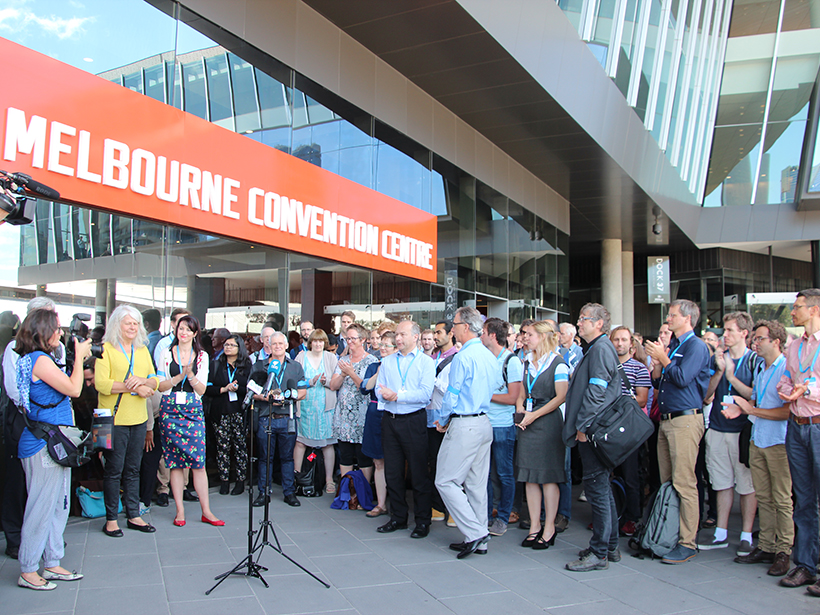Australia’s scientific community is expressing some measure of relief after a top deputy to Prime Minister Malcolm Turnbull ordered the country’s independent research agency to go further in scaling back its plans to cut much of its basic climate research staff.

The directive from Science Minister Greg Hunt will restore 15 lost jobs and inject $37 million in new climate research funding over the next decade at the Commonwealth Scientific and Industrial Research Organisation (CSIRO), his office said on 8 August. That comes alongside a broader $100 million, 3-year boost in funding across the board for CSIRO following federal elections last month.
Many scientists said they were pleased that Turnbull’s government finally intervened after previously staying on the sidelines in the controversy over CSIRO, which dates back to early this year. Still, some argued that the intervention was too little too late and that details on its practical impact are still lacking.
“This is a good first step, but there are still a large number of very significant questions,” Will Steffen, a climate researcher at Australian National University’s Climate Change Institute, told Eos by phone.
Another Partial About-Face
“This is a good first step, but there are still a large number of very significant questions.”
The development comes on top of a previous partial about-face by CSIRO leadership itself in April. CSIRO head Larry Marshall had announced the creation of a new Climate Science Centre (CSC) to oversee and coordinate much of CSIRO’s remaining modeling and measurement projects. CSIRO leadership also said, at the time, that the agency had reduced its planned job reductions from roughly 70 to 40 of the agency’s 140 climate research staffers.
The first job reductions plan came to light in February, when Australian media reported that CSIRO leadership told staff of its proposed cuts coupled with new hires in other areas. CSIRO leaders wanted to shift focus toward climate change mitigation and adaptation, arguing that Australia needed economically innovative research to stay globally competitive.
“Massive community concern on this issue has forced the government to act, but this is merely a Band-Aid solution to a major problem.”
Scientists and scientific organizations across the world—along with leaders from the opposition Labor Party and the Australian Greens—called CSIRO’s plans a blow to Australia’s scientific reputation and said other Australian research institutions might not be able to compensate for the capacity reduction. They also argued against the research focus shift, rejecting Marshall’s assertions that scientists had gained sufficient understanding of Earth’s climate system.
Now, with the 15 restored jobs, CSIRO’s climate research staff will stand at about 115, Hunt told the Australian Broadcasting Corporation’s AM show on 4 August. Moreover, in a speech on 8 August to the Australian Academy of Science (AAS), Hunt said that the new funding and jobs for CSIRO would help create a decadal climate monitoring and forecasting program within CSC.
A “Band-Aid” Fix?
The CSIRO Staff Association used the news to call on CSIRO to completely halt the remaining job cuts. It also took a swipe at Turnbull’s government for 6 months of inaction followed by a halfhearted attempt to fix the problem.
“Massive community concern on this issue has forced the government to act, but this is merely a Band-Aid solution to a major problem,” Sam Popovski, the association’s secretary, said in a statement.
“Overall, CSIRO still—and Australia—has had its scientific reputation damaged significantly.”
Hunt’s office directed questions from Eos to the transcripts of Hunt’s AM interview and his speech. CSIRO’s press office didn’t respond to requests for comment.
In a statement, AAS, which has been reviewing the country’s climate science capabilities, called the job and funding boost a “positive step,” as long as it “is effectively led and coordinated.”
Steffen expressed hope that AAS’s review would shed light on the net impact of the CSIRO cuts and the partial reversals on Australia’s climate research capabilities. “The critical question is, what does this mean in reality, in the details?” Steffen said. “We still don’t know for sure.”
Australia’s Scientific Reputation
Steffen also argued that the additional funding and restored jobs—even if implemented properly—wouldn’t undo the damage that the CSIRO cuts inflicted on a scientific reputation that Australia had taken “many, many years” to build.

Steffen cited the news that renowned CSIRO sea level researcher John Church was among the staffers who lost their jobs as symbolic of the damage the cuts have inflicted. “That can’t be undone for a long time,” Steffen said.
Church told Eos by phone that he would decline a chance to apply to be redeployed, citing the painful nature of the CSIRO controversy. He said that his last day at work is 28 August. He was uncertain about what will become of CSIRO’s sea level research.
“Overall, CSIRO still—and Australia—has had its scientific reputation damaged significantly,” Church added.
Hunt rejected that notion in the AM interview. “I don’t accept that, but I do accept that our job is to take where we are now and to strengthen the science and to strengthen our reputation, to attract great scientists from around the world,” he said, adding that the “clear direction” that he and Turnbull were ushering in would aid in that endeavor.
—Puneet Kollipara, Freelance Writer; email: [email protected]
Citation:
Kollipara, P. (2016), Scientists bittersweet as Australia backtracks on climate cuts, Eos, 97, https://doi.org/10.1029/2016EO057677. Published on 16 August 2016.
Text © 2016. The authors. CC BY-NC-ND 3.0
Except where otherwise noted, images are subject to copyright. Any reuse without express permission from the copyright owner is prohibited.

